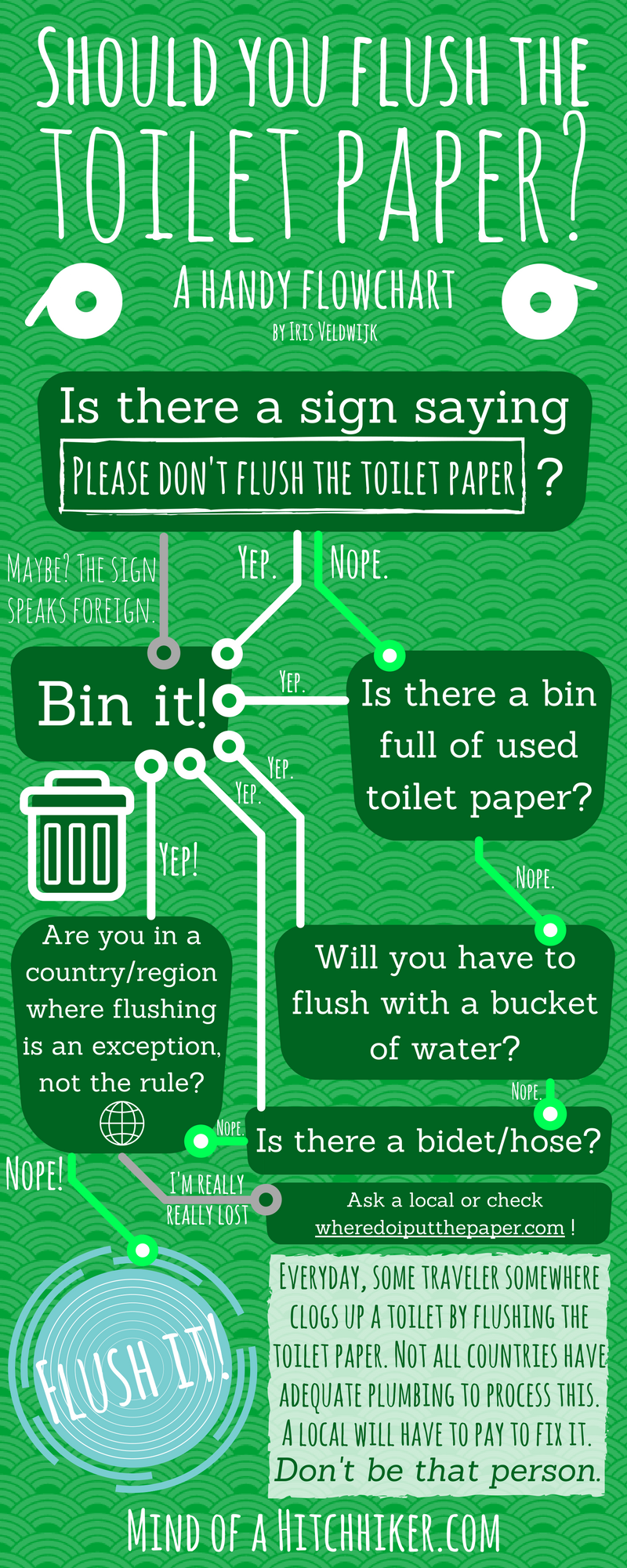The surprising places you can't flush toilet paper, even with fully flushing toilets
Greece, Thailand and dozens of other countries have fully flushing toilets but "no flushing the TP" rules.
Even with fully flushing toilets, you can't always flush toilet paper.
In the U.S., it's normal in women's restrooms to see signs that say "Do not flush feminine products," so if you're traveling internationally and you see a sign that says not to flush paper down the toilet, you might assume it means the same thing.
It doesn't. If you're traveling abroad and you see a "no paper in the toilet" sign, it usually means all paper—including the toilet paper you use to wipe with.
My first time experiencing this reality was in Indonesia. The friend I was visiting lived in a large luxury home, modern in every way—except you had to toss your toilet paper into a bin instead of flushing it. Even rustic campsite pit toilets in the U.S. allow you to put toilet paper in them, so it went against every instinct I had not to toss the TP in the toilet after using it and put it in the little bin next to the toilet instead.
Then I encountered the same thing in Thailand, then in Greece, then in Patagonia in South America. These were all places with American-style flushing toilets, so it was unexpected that TP flushing was a no-no. If this is the norm in such vastly different regions, how common is "no TP flushing" around the world?
Surprisingly common for the 21st century, actually. As many advancements as we've made in engineering and technology, there are still lots of established plumbing systems underground that don't handle anything other than onesies and twosies very well.
For people from always-flush-the-TP countries, the inability to flush toilet paper can come as a shock, especially when the toilets seem no different than the ones at home. It's confusing that the toilet paper will physically flush down at the source, it just shouldn't be flushed because of what can happen on down the line.
In Greece, for example, the plumbing pipes are only two inches in diameter, compared to four inches in the U.S., which means paper clogs the pipes much more easily. Our Airbnb host in Athens told us if we smell a terrible sewage smell and hear a big motor running somewhere in the neighborhood, it's because people had flushed toilet paper and the sewage system had to be pumped. Brazil apparently has plumbing similar to Greece, and there are plenty of other countries in the same boat.

Where in the world can you flush your toilet paper?
So where are all of these countries? Well, hard to say exactly, as the most recent map I've seen (from mindofahitchiker.com above) is from 2017 based on information from 2012, and things may have changed in some of those countries by now. On this map, the green countries are safe to flush, the orange are "it depends" and the red are generally no-flushers.
Most places where you can't flush paper have signs saying so, but sometimes they're in another language and sometimes there just aren't signs because the assumption is that you know. Thankfully, mindofahitchhiker.com also offers a handy "Flush or not to flush?" flowchart to help you figure it out:

Find out more at mindofahitchhiker.com
Surprisingly, putting TP in a bin isn't as disgusting as I imagined it would be, nor is it stinky like I assumed it would be. In Indonesia and Thailand, nearly all toilets had a "bum gun"—a handheld water sprayer attached to a hose that hung on the side of the toilet—which helped everything feel a bit cleaner on that front. (I loved it so much I bought one to install at home after my trip.) But even without the hoses, the TP bins have plastic liners and usually fliptop lids you open with your foot, so it doesn't really feel as unsanitary as it sounds. And those bins appeared to be emptied frequently almost everywhere I was, so it wasn't any grosser of an experience than using a public restroom in the U.S. (There's also a generally expected level of courtesy, it seems, to make sure your used TP is folded or wadded in such a way as to not gross out other people.)
It may not be ideal and it may fly in the face of our normal habits, but I'm sure we'd all agree that plumbing working properly is important. So if you're traveling to country you've never been to before, do a little research, follow the toilet signs, and when in doubt, toss instead of flush. The locals will thank you.

